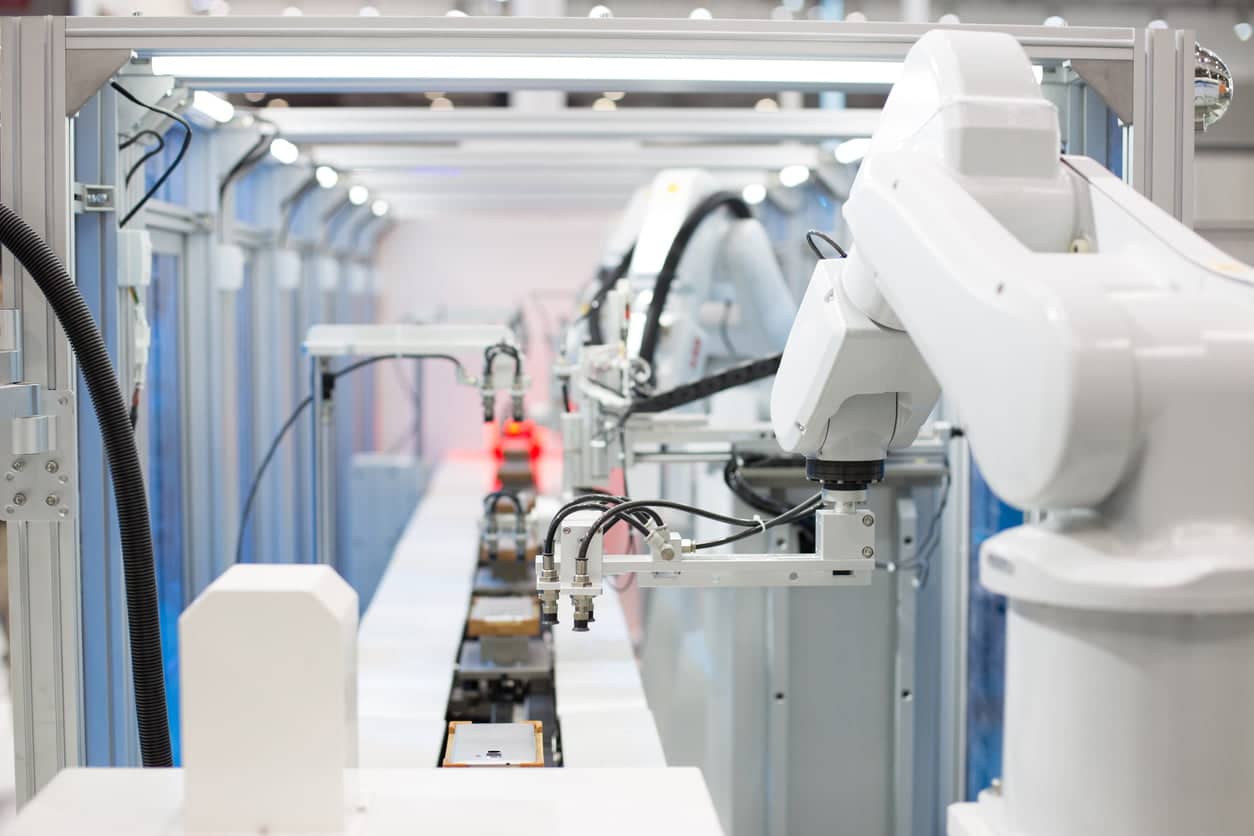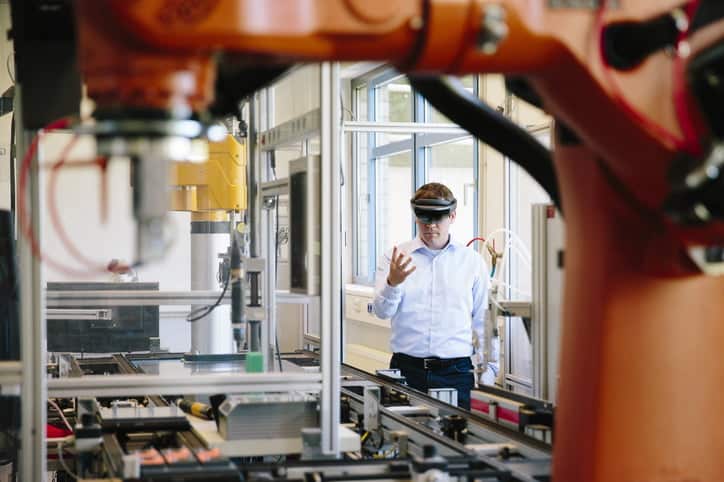The Biggest Trends and Challenges in Manufacturing Right Now

Global crises, disruptive technologies, and the ongoing digital revolution; much in the world of business is changing, and nowhere is this more keenly felt than the manufacturing sector.
Never before have manufacturers faced such a turbulent, ever-evolving trading landscape. And yet, even in times of apparent hardship, firms across the industrial divide are finding solace, value and support in emerging technologies and progressive business trends.
So, as we look ahead to the rest of 2021, what challenges and trends do manufacturers face? And how will digital transformation continue to affect manufacturing supply chains across the UK’s industry sectors?
Here, we’re taking a look at the biggest trends and challenges in the world of manufacturing.
Trends
From tech to waste management, which trends look set to hold sway over the manufacturing sector in 2021 and beyond? Let’s take a look.
The Rise of the ‘Cobot’
Robots have become a prevalent part of modern manufacturing processes, but how we interact with this type of technology has often come under scrutiny. Now, however, a new age of automated manufacturing is upon us, and it’s been led by so-called ‘cobots’ – collaborative robots designed to work seamlessly alongside existing human personnel.
What are the advantages of collaborative robots? For starters, they facilitate greater collaboration between man and machine, eliminating downtimes and providing greater opportunity for agile, ad-hoc adjustments and refinement.
What’s more, it’s believed cobots could reduce the strain on manufacturers who, through loyalty to their personnel, are yet to embrace such technology. Cobots, unlike other forms of robotics, do require regular human interaction, making it justifiable to retain personnel.

Environmentally-Conscious Manufacturing
As the climate crisis shows no signs of abating, one positive that can be taken from the ongoing fight against global warming is the cross-industry reduction in energy consumption – including manufacturing. According to recent UK energy consumption data, the manufacturing industry’s reliance on fossil fuels is on a downward trajectory, as more businesses embrace biofuels and alternative energy sources.
Of course, cutting energy consumption has always been a chief concern for manufacturers, with cost reduction being the primary impetus. Now, however, consumer demand and governmental pressure mean that businesses are cutting consumption for ecological reasons too, in a bid to bolster their green credentials.
In the coming months and years, it’s expected that manufacturers will continue to seek environmentally-conscious alternatives to key processes and resources, benefitting from both monetary and reputational gains.
Smart Factories and the Internet of Things
Throughout the manufacturing supply chain, processes are getting smarter. Aided by emerging technologies, manufacturers are growing to rely more heavily on next-gen tech – from artificial intelligence to smart devices, powered by the Internet of Things.
From a purely technological point of view, smart factories are perhaps the defining trend in the manufacturing industry for 2021. New, advanced technologies and software have made data-backed decision-making and automated processes simpler and easier to control, facilitating reduced costs, improved efficiencies, and faster response times.
One of the other benefits of adopting next-generation smart devices in a manufacturing setting has been enhanced personnel safety. With machines being more adaptive, responsive and accurate than ever, those working alongside them are feeling the benefit of increased safety and ease of use.

Waste Reduction
Reducing waste, like curbing energy, has been a point of focus for many manufacturers for some time now. But with all eyes on responsible recycling and the plastic problem, firms are having to go even further to prove they’re taking their waste reduction commitments seriously.
The great news for such businesses is that there has never been a better time to make a waste reduction pledge. With countless recycling partnerships, schemes and initiatives available, all aimed at helping businesses reduce waste and recycle more, 2021 looks set to become the year in which all UK manufacturers take stock and sure-up their waste management policies and strategy.
Challenges
2020 proved a challenging year for manufacturers, to put it mildly. And with the repercussions of the past 12 months continuing to cause problems, 2021 may not be as smooth as many were hoping for.
Here are some of the main challenges which manufacturers face as we move towards the middle of 2021 Q1.
Covid-19
Without question, the ongoing pandemic continues to be a colossal challenge for manufacturers, sowing unpredictability and doubt along the entire supply chain. Thankfully, there are now green shoots of recovery in the form of the Covid-19 vaccines, but it will take time for the landscape to stabilise.
In the meantime, businesses should look to sure-up their supply chain, cooperating regularly with trade partners and suppliers. With some evidence to suggest the pandemic is moving in the right direction, you must be ready to hit the ground running and recoup losses when the markets recover.

Brexit
Regardless of deals and negotiations, Brexit was never going to be a simple transition, and this has certainly proven to be the case. With long queues at customs depots, question marks around Northern Ireland’s borders, and higher costs for consumer goods from the EU; 2021 has, so far, been stymied by the seemingly relentless bureaucracy of the Brexit transition process.
However, this was, as touched on above, never going to be easy, and many manufacturers have been pleasantly surprised by the transition’s smoothness given the circumstances. As we move further into 2021, it’s hoped that early flaws will be swiftly ironed out, paving the way for an all-hands-to-the-pump recovery in the aftermath of Covid-19.
The ‘Amazon Effect’
In recent years, many smaller manufacturers have faced a previously insubstantial problem: the Amazon effect. This relates to the huge demand generated by the web giant, and how it puts pressure on manufacturers and suppliers across the supply chain.
Amazon’s low-cost pricing and rapid delivery promise may be good news for consumers, but for manufacturers, it presents a huge challenge. While supplying the company with goods is certainly good for business, meeting the relentless demand, both in terms of cost and supply, puts significant strain on smaller manufacturers not used to such volumes.
What’s more, the Covid-19 crisis has done little to slow Amazon down, with the world-spanning retailer taking full advantage of the rise in online-only shopping. As such, the margins for manufacturers have become even tighter, with smaller suppliers simply unable to deliver on its commitments.
It’s for this reason that tech adoption is business-critical for manufacturers looking to keep pace with the likes of Amazon. Investing in the right software to support supply chain improvements is now essential in getting goods in front of customers.
We hope you’ve enjoyed this speculative look at the trends and challenges manufacturers face in 2021. Do you agree with our list? What do you think is most likely to impact UK businesses in the coming months and years?
At JS3 Global, we’re experts at matching businesses with software that can take their enterprise to the next level. If you’d like to learn how ERP software solutions can help your business, visit the homepage or call our team today on +44(0)161 503 0866.